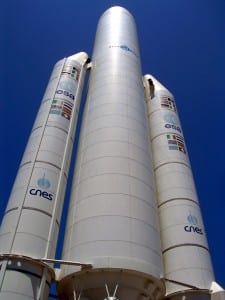The future of Europe’s missions in space: small steps or giant leaps?
By Oli Usher, on 2 February 2014
Serge Plattard, an international space policy expert recently appointed as honorary professor at UCL, gave a whirlwind tour of the politics of space in his inaugural lecture on 22 January. Covering everything from human spaceflight to navigation systems, and launching from topic to topic faster than an Ariane 5 rocket, Plattard’s whole lecture is hard to summarise.
But one fundamental truth ran through everything he said, including his talk’s title: space policy, economics and society are now all closely intertwined, and their mutual impact on each other is growing.
Although we still think of space as part of the public sector, with NASA, the European Space Agency and their Russian and Chinese counterparts dominating much of the mindshare, the days of state domination of space are over, he said. The total world spend on space is now over $300bn per year, of which less than $80bn is spent by governments. Private broadcasting alone spending alone outspends every public space agency in the world, and so does the geolocation sector.
So game over for public money in space? Not so fast. While the private sector is large and growing, and the public sector is under budgetary pressure, governments still have a big role to play. In many respects, space agencies still need to lead, whether it is for science, defence or the broader strategic motivations. They only need to learn to play together.
Plattard is a fellow of the European Space Policy Institute, and a former senior staffer at CNES, the French space agency, so he has been deeply immersed in the politics of space for years. I worked on the edges of the European space programme until last year, and through UCL I still catch glimpses of it. Even I as a (relative) nobody I can see how political it gets. So I can only guess what Plattard must have seen at the top.
But he is also a former diplomat (he served as the French Embassy in London’s scientific attaché until 2012). And if diplomats can do one thing better than anything else, it’s to find incredibly tactful ways to say uncomfortable things.
One of these hidden barbs was at the failure of space agencies to get on with each other. Though Europe and the US have forged a number of successful collaborations (the Hubble Space Telescope, the International Space Station and the Herschel Space Observatory, to name but a few), collaboration with Russia, Japan and, in particular, China is far from optimal. On top of this, Plattard said, Europe has the problem of a space policy that’s split between the EU and the European Space Agency (two organisations whose memberships only partly overlap). Although the broad direction of policy he outlined seems to be moving in the right direction, it would be hard not to detect a note of frustration at the cumbersome and uncoordinated way this policy evolves.
Another hint of frustration – though so subtly expressed I wondered if might even have been subconscious – was with his homeland. Without comment, Plattard pointed out that France’s large public spending in space (by far the highest in Europe at €30 per person, per annum) goes on prestige projects like spaceports, launchers, astronauts and satellites, which don’t actually bring a large economic return. Britain’s far more modest public spending on space has helped nurture a large and profitable private sector in telecoms and satellite TV.
But whatever the right approach is, and how quick our disjointed international collaborations will let us get there, Plattard gave an optimistic view of how the economic, social and political uses space will continue to evolve, with costs falling, technology improving, economic benefits rising, new services emerging and – perhaps – space agencies around the world learning to work together a little more effectively.
 Close
Close



